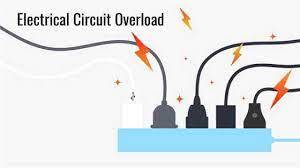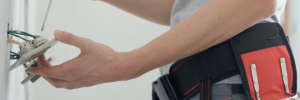The Dangers of an Overloaded Circuit: Understanding the Risks and Prevention Measures

Are you aware of the dangers of an overloaded circuit? Electrical systems are designed to handle a specific amount of electricity, and when that limit is exceeded, it can lead to a variety of problems. Overloaded circuits can cause damage to electrical appliances, increase the risk of electrical fires, and even lead to electrocution. In this article, we will explore the dangers of an overloaded circuit, the signs to look out for, and what you can do to prevent it.
Understanding Overloaded Circuits
An overloaded circuit occurs when more electrical current flows through a circuit than it was designed to handle. Electrical systems are designed to handle a specific amount of electrical current, and when that limit is exceeded, it can cause a variety of problems. This can be caused by plugging too many electrical devices into one outlet, using extension cords improperly, or using damaged or frayed cords.
The Dangers of an Overloaded Circuit
An overloaded circuit can cause significant damage to your electrical system and pose a significant risk to your safety. Here are some of the dangers of an overloaded circuit:
Electrical Fires
One of the most significant dangers of an overloaded circuit is the risk of an electrical fire. When too much electrical current flows through a circuit, it can generate heat and cause wires to melt or ignite nearby combustible materials. This can lead to a fire that can quickly spread throughout your home.
Electrical Shock
Another danger of an overloaded circuit is the risk of electrical shock. When too much electrical current flows through a circuit, it can cause a short circuit, which can generate a high level of voltage. This can lead to an electrical shock if you come into contact with a live wire or appliance.
Damaged Electrical Appliances
An overloaded circuit can also cause damage to your electrical appliances. When too much electrical current flows through a circuit, it can cause your appliances to overheat and fail prematurely. This can result in costly repairs or even the need to replace your appliances altogether.
Increased Energy Bills
Another danger of an overloaded circuit is the impact it can have on your energy bills. When too many electrical devices are connected to one circuit, it can cause your energy usage to spike, leading to higher energy bills.
Signs of an Overloaded Circuit
It’s essential to be aware of the signs of an overloaded circuit so that you can take action before it becomes a significant problem. Here are some signs that you may have an overloaded circuit:
Circuit Breaker Tripping Frequently
If your circuit breaker trips frequently, it may be a sign that you have an overloaded circuit. The circuit breaker is designed to trip when too much electrical current flows through a circuit, and this can happen when you have too many devices connected to one circuit.
Flickering Lights
Another sign of an overloaded circuit is flickering lights. When too much electrical current flows through a circuit, it can cause the voltage to fluctuate, leading to flickering or dimming lights.
Buzzing Outlets or Switches
If you hear a buzzing sound coming from your outlets or switches, it may be a sign of an overloaded circuit. The buzzing sound can be caused by the electrical current trying to pass through a circuit that can’t handle the load.
Warm or Hot Outlets
If your outlets or switches feel warm or hot to the touch, it may be a sign of an overloaded circuit. This can be caused by too much electrical current flowing through a circuit, causing the wires to heat up.
Prevention Measures
The best way to prevent an overloaded circuit is to be proactive and take measures to reduce the risk. Here are some prevention measures you can take:
Avoid Overloading Circuits
One of the most important prevention measures is to avoid overloading circuits. Make sure not to plug too many electrical devices into one outlet or power strip. Consider spreading out your devices across multiple outlets or using additional power strips to distribute the load.
Use Extension Cords Properly
When using extension cords, make sure to use them properly. Avoid using damaged or frayed cords, and never connect multiple extension cords together. Instead, use a single extension cord that is long enough to reach your desired location.
Upgrade Your Electrical System
If you have an older electrical system or frequently experience overloaded circuits, consider upgrading your electrical system. A licensed electrician can assess your system and recommend upgrades or additions to reduce the risk of an overloaded circuit.
Unplug Unused Devices
Unplugging unused devices is another way to reduce the risk of an overloaded circuit. If you’re not using a device, unplug it from the outlet to reduce the load on your electrical system.
Install AFCIs or GFCIs
Installing Arc Fault Circuit Interrupters (AFCIs) or Ground Fault Circuit Interrupters (GFCIs) can also help reduce the risk of an overloaded circuit. AFCIs can detect and stop electrical arcs that can lead to fires, while GFCIs can detect and stop electrical shocks.
Frequently Asked Questions
Can an overloaded circuit cause a fire?
- Yes, an overloaded circuit can cause a fire by generating heat that can melt wires or ignite nearby combustible materials.
What are the signs of an overloaded circuit?
- The signs of an overloaded circuit include circuit breaker tripping frequently, flickering lights, buzzing outlets or switches, and warm or hot outlets.
How can I prevent an overloaded circuit?
- You can prevent an overloaded circuit by avoiding overloading circuits, using extension cords properly, upgrading your electrical system, unplugging unused devices, and installing AFCIs or GFCIs.
What should I do if I suspect an overloaded circuit?
- If you suspect an overloaded circuit, unplug some of your devices to reduce the load on your electrical system. If the problem persists, contact a licensed electrician.
How often should I have my electrical system inspected?
- It’s recommended to have your electrical system inspected by a licensed electrician at least once every ten years.
Can I fix an overloaded circuit myself?
- No, fixing an overloaded circuit requires the expertise of a licensed electrician. Attempting to fix it yourself can be dangerous and potentially lead to further damage.
Conclusion
An overloaded circuit can pose significant risks to your safety and your home. By understanding the dangers of an overloaded circuit, the signs to look out for, and the prevention measures you can take, you can reduce the risk of an electrical fire, electrical shock, and damage to your electrical appliances. If you suspect an overloaded circuit, contact a licensed electrician to assess your system and recommend necessary upgrades or repairs.
Remember, prevention is key to maintaining a safe and efficient electrical system. Stay vigilant and take action to protect yourself and your home from the dangers of an overloaded circuit.




